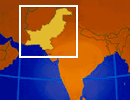 |
 |
11.28.06

Charismatic Leadership and Social Change The problem of leadership appears most urgently at defining moments of history. A sharp crisis in social, economic and political affairs, when something must be done and done quickly, naturally intensifies interest in the role of a leader in history making. The society-shattering deed is possible only when the society is ripe for it. In the biblical phrase, things happen in the fullness of time. Delivery may be forced, but the child must be ready to enter the world. The leader acts only as a midwife who brings forth what is already mothered by the spirit of the age, or as the Germans say ‘zeitgeist’. We cannot sit back and wait for the event to happen. This is where commitment comes in. These who stand and wait are either cowards or traitors to the cause.  Apart from the qualities enumerated by Iqbal— lofty vision, mellifluous discourse and a passionate heart—the leader must possess charisma. [W]hen a social order nears bankruptcy, there is actually felt a desire among the people for a charismatic leader who may symbolize their deeply felt needs and aspirations. The charismatic leader is born in a climate of uncertainty and unpredictability. He moves in to bridge the gap between the discredited past and uncertain future. When the two ages overlap, one dying and the other refusing to be born, the historic need for charismatic leader arises, who has his hand on the pulse of time, and, who, above all, is closely attached to the common people. He is fired by the passion, inspired by the vision and totally committed to extricate the distraught people from the agony of uncertainty so as to lead them to safe haven. Tolstoy has correctly pinpointed the source of power of a charismatic leader. He says: “The power of a great leader lies neither in the physical nor moral qualities of him who possesses it. Power is the collective will of the people transferred by expressed or tacit consent to their chosen leader.” The objective conditions may be ripe for the radical transformation of a society, but without a leader who can command the respect and love of the masses, the historic opportunity may be lost. As former US president Woodrow Wilson once said: “When I look back on the process of history, I see this writing over every page that the nations are renewed from the bottom, not from the top, that the genius who springs from the ranks of the unknown men is the genius who renews the youth and energy of the people. The utility, the vitality and the fruitage of life does not come from the top to the bottom, it comes like the natural growth of a great tree from the soil, up through the trunk into the branches to the foliage and the fruit. The great struggling unknown masses that are the base of everything are the dynamic force that is lifting the levels of history. A nation is as great and only as great as her rank and file.” It is the dialectical relation between the charismatic leader and the struggling masses that makes history.
Posted by Michael McKinney at 12:01 AM
|
BUILD YOUR KNOWLEDGE
 

How to Do Your Start-Up Right STRAIGHT TALK FOR START-UPS 
Grow Your Leadership Skills NEW AND UPCOMING LEADERSHIP BOOKS 
Leadership Minute BITE-SIZE CONCEPTS YOU CAN CHEW ON 
Classic Leadership Books BOOKS TO READ BEFORE YOU LEAD |